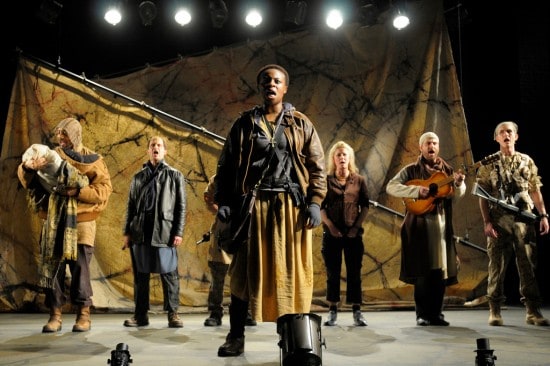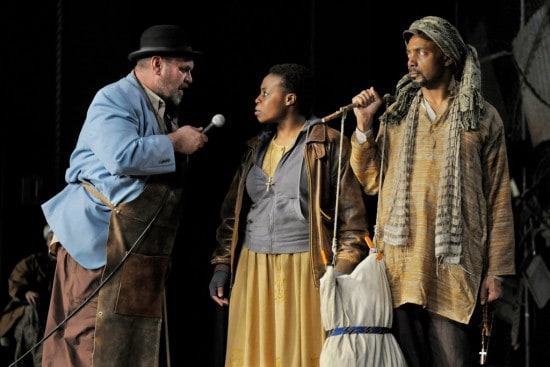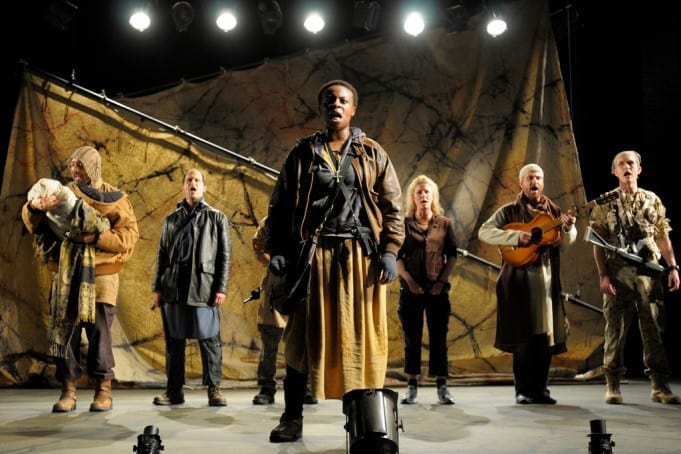
The Words on Plays synopsis I read in the passenger seat by a dimly lit book light did not prepare me for what transpired on stage at A.C.T.’s World Premiere of The Caucasian Chalk Circle.
Playwright Bertolt Brecht’s creation tells the tale of a mother’s love in a period of intense political turmoil. The play was first produced in German by Brecht’s Berliner Ensemble. However, on this night, it was the world premiere version as envisioned by Domenique Lozano’s A.C.T.-commissioned translation and directed by John Doyle.
The stage set had an urban feel to it with a chain link fence spanning almost the entire width and height of the stage in the foreground. Behind, a desolate landscape of protruding junk yard pieces and garbage scattered on the ground. At first glance, I was intrigued and captivated with the desire to see how the play unfolds. The first few minutes were astounding with bright lights crashing down and the swirl of the activity as the ensemble enters onto stage.
However, just when I thought this would be another refreshing look at a classic piece, I suddenly realized the piece had tipped the balance from ambitiously creative to absurd.

It was apparent that this version aimed towards creating something surreal. Yet for such a style to work, and still make the emotional connection with the audience, I think a rhythm to the play must be maintained so that the audience can suspend disbelief as they immerse themselves into the world on stage.
Yet the disheveled arrangement of cast movement on stage, the lack of cohesive timing in dialogue all snapped me back to reality and I could not keep my disbelief at bay long enough to see the child Michael (Governor wife’s only child and heir) as more than a well-loved pillow.
There were a few gems in the production I thought. Mainly when there were a few cast members on stage, when the movement becomes less chaotic. In those moments, I catch hints of the emotional layers and depth that such a play and subject matter must have to truly convey the meaning of this piece.
As you can probably tell by now, the play was broken down into little skits that when strung together told the entire story of the plight of two mothers, one by blood and one by sweat. Some of these vignettes worked better than others. However, overall, I thought the production was more a delight for actors to perform than for the audience to watch. I’d liken it to the playing of an arpeggio; great for the honing in of acting chops, but not so harmonious to the eye.

In the end of act 1, I felt that perhaps the play was starting to come together in some cohesive manner. However, this was quickly shattered in act 2 as the fourth wall was torn down and a bit of slap stick humor was applied. This part was entertaining, however a bit distracting to the already schizophrenic pace.
Alas we get to a point where I would have wanted to feel the poignancy of the Solomon tale-inspired conclusion…a dramatic moment, a revelation on the age-old tale.
Nothing.
The play had thrown so many curve balls, my senses were exhausted.
Clint says:
Welcome to just another night of absurdest, fourthwall theater at the ACT improv.
I’ll give it this: it’s a wild, unpredictable ride. The material is so obtuse, though, it’s hard, at least in my books, to call it entertaining.
It feels, how do I say this… so last century. I’m sure pundits and purists would scoff: it’s genius! Intelligent! I’m sure it’s all that. But unless you’re studied, I’m quite convinced most will be lost, perplexed or just bored.
Call me pedestrian. Unwashed. Fine, fine. But on this night I did not get it one iota. Too bad, I was looking forward to seeing Rod Gnapp on the grand ACT stage. But he was either lying dead (sort of) or playing a xylophone.
I’ll give this to ACT though: they swing for the fences. And it always (always) makes for an unforgettable outing, good or bad.



